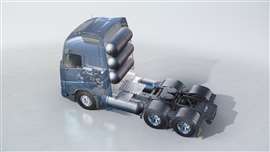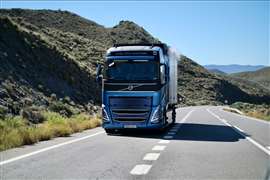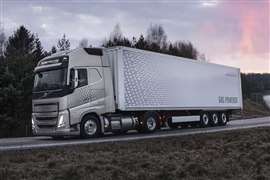Volvo developing hydrogen-fueled trucks
23 May 2024
 Volvo trucks with hydrogen-fueled combustion engines will feature high pressure direct injection (HPDI). (Source: Volvo Trucks)
Volvo trucks with hydrogen-fueled combustion engines will feature high pressure direct injection (HPDI). (Source: Volvo Trucks)
Volvo Trucks announced it is developing trucks with hydrogen-fueled internal combustion engines (H2-ICE). On-road tests of trucks with the engines will begin in 2026, with commercial launch planned toward the end of this decade. Testing of the engines in labs and in vehicles is currently ongoing.
Volvo trucks with H2-ICEs will feature high pressure direct injection (HPDI), a technology where a small amount of ignition fuel is injected with high pressure to enable compression ignition before hydrogen is added. The advantages include higher energy efficiency with lower fuel consumption and increased engine power, the company stated.
Volvo Group has previously announced the signing of an agreement with Westport Fuel Systems to establish a joint venture utilizing HPDI technology. The joint venture is anticipated to become operational in the second quarter of 2024, following formal closing.
The H2-ICE trucks will complement Volvo’s offering of other alternatives, such as battery-electric trucks, fuel cell electric trucks and trucks that run on renewable fuels, such as biogas and HVO (hydrotreated vegetable oil). The company said that hydrogen-fueled trucks are especially suitable for longer distances and in regions with insufficient charging infrastructure or where time for recharging batteries is limited.
“Trucks where the traditional internal combustion engine remains but runs on hydrogen will have the same performance and reliability as our diesel trucks, but with the added benefit of potentially net-zero CO2 emissions well-to-wheel,” said Jan Hjelmgren, head of Product Management and Quality, Volvo Trucks. “They will be a valuable complement to our battery-electric trucks, which have been on the market for several years.”
 Volvo will launch trucks with combustion engines that can run on green hydrogen. (Photo: Volvo Trucks)
Volvo will launch trucks with combustion engines that can run on green hydrogen. (Photo: Volvo Trucks)
The company added that trucks with ICEs powered by green hydrogen have the potential to deliver net-zero CO2 well-to-wheel when using HVO as ignition fuel, and would be categorized as “Zero Emission Vehicles” (ZEV) under the new EU CO2 emission standards.
“It’s clear that several kinds of technology are needed to decarbonize heavy transport. As a global truck manufacturer, we need to support our customers by offering a variety of decarbonization solutions, and customers can choose their alternative based on transport assignment, available infrastructure and green energy prices,” said Hjelmgren.
STAY CONNECTED




Receive the information you need when you need it through our world-leading magazines, newsletters and daily briefings.
POWER SOURCING GUIDE
The trusted reference and buyer’s guide for 83 years
The original “desktop search engine,” guiding nearly 10,000 users in more than 90 countries it is the primary reference for specifications and details on all the components that go into engine systems.
Visit Now
CONNECT WITH THE TEAM










